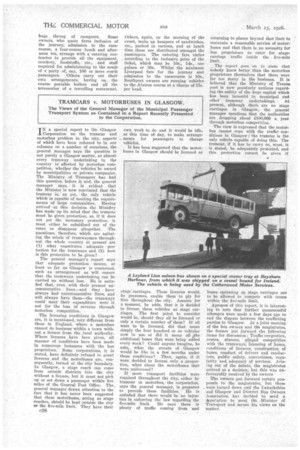TRAMCARS v. MOTORBUSES IN GLASGOW.
Page 26

If you've noticed an error in this article please click here to report it so we can fix it.
The Views of the General Manager of the Municipal Passenger Transport System as Contained in a Report Recently Presented to the Corporation.
IN a special report to the Glasgow Corporation on the tramcar and motorbus problem in the city, aspects of which have been referred to in our columns on a number of occasions, the general manager says the question is not purely a Glasgow matter, as almost every tramway undertaking in the country is' affected by motorbus competition, whether the vehicles he owned by municipalities or private companies. The Ministry of Transport has had this question before it and, the general manager says, it is evident that the Minister is now convinced that the tramcar is, as yet. the _ only vehicle which is capable of meeting the requirements of large communities. Having arrived at this decision. the Ministry has made up its ,naind that the tramcar must be given protection, as, if it does not get the necessary protection, it must either he subsidized out of the rates or disappear altogether. The questions, therefore, which are agitating the minds -of tramwaymen throughout the whole country at present are (1) what constitutes . adequate protection for the tramways and (2) how is this protection to be given? •
The general manager's report says that adequate protection means, at least so far as Glasgow is concerned. such an arrangement as will ensure that the tramways undertaking can be carried on without loss. He is satisfied that, even with their present unremunerative lines—and they have always had unremunerative lines, and will always have them—the tramways could meet their expenditure were it not for the loss of revenue through motorbus competition.
The licensing conditions in Glasgow are, it is mentioned,.very different from those in England, where a motorbus cannot do business within a town without a licence from the local authority. Where licences have been given, all manner of conditions have been made in numerous instances with the bus proprietors. Some corporations, it is stated, have definitely refused to grant licences and the motorbuses are, consequently, turned at the city boundary. In Glasgow, a stage coach can come from outside districts into the city without a licence, but it must not pick up or set down a passenger within five miles of the General Post 'Office. The,. general manager draws attention to the fact that it has never beta suggested that these motorbuses, acting as stage coaches, slibuld be kept otitside the city or the five-mile limit. They have their c38 own work to do and it would be idle, at this time of day, to make arrangements for passengers to change vehicles.
It has been suggested that the motorbuses in Glasgow should be licensed as
stage carriages. These licences would, he presumes, enable them to ply for hire throughout the city. Assume for a moment, he adds, that it is decided to license these vehicles as stage carriages. The first point to consider would be, should they all be licensed or only a certain number of them? If all were to be licensed, did that mean simply the four hundred or so vehicles now in use or did it mean all he additional buses that were being added every week? Could anyone imagine, he asks, what the streets of Glasgow would be like in a few months under these conditions? Then, again, if it were decided to license only. a proportion, what about the motorbuses that were unlicensed?
If more transport facilities were required throughout the city, either by tramcar or motorbus, the corporation, says the general manager, is prepared to provide these facilities. He is satisfied that there would be no injustice in enforcing the law regarding the five-mile limit. Be siva there is plenty of traffic coming from 'and returning to places beyond that limit to maintain a reasonable service of motorbuses and that there is no necessity for bus proprietors to cater for stagecarriage traffic inside the five-mile limit.
The report goes on to state that nobody knew better than the motorbus proprietors themselves that there were far too many in the business. It is believed that the Ministry of Trans& port is now genuinely anxious regarding the safety of the huge capital. which has been invested in municipal and other tramway undertakings. At present, although there are no stage carriages in Glasgow, the general manager mentions that the authorities are dropping about f100,000 a year through motorbus competition.
The view is expressed that the motorbus cannot cope with the traffic conditions in Glasgow the tramcar is the only vehicle capable of doing this. 'The tramcar, if it has to carry on, must, it is stated, be adequately protected, and this protection cannot be given if buses operating as stage carriages are to be allowed to compete with trams Within the five-mile limit.
Apropos of this report, it is interesting to note that further unsuccessful attempts were made a few days ago to end the dispute between the conflicting parties in Glasgow. At a joint meeting of the bus owners and the magistrates, the former put forward the following items for discussion; Traffic congestion, routes, stances, alleged competition with the tramways", licensing of buses, eonditions of licences, construction of buses, conduct of drivers and conductors, public safety, convenience, regularity and adequacy of services. Arising out of the debate, the magistrates arrived at a decision, but this was unfavourably received by the owners.
The 'owners put forward certain proposals to the magistrates, but these were'turned down and the Lanarkshire and Glasgow arid District Bus °milers AssOciation. has decided to send . .cipputatien to pleat the :Minister Of Trensport and 'secure his views on the
'matter. •
































